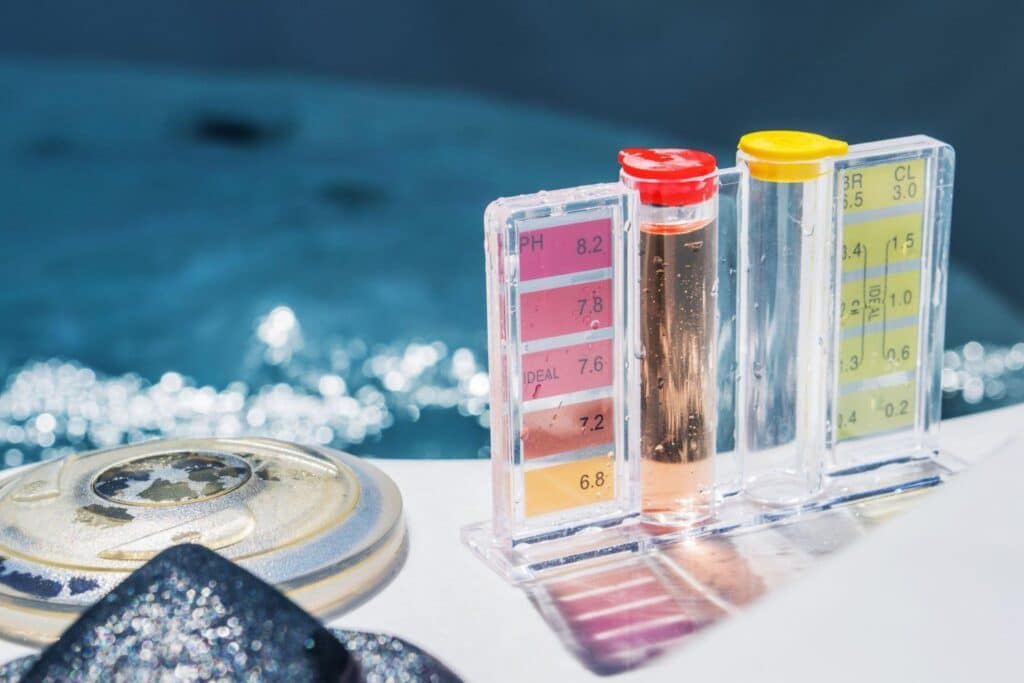
If your pool water feels a little off, it might not be just the temperature. A low pH level can cause a whole host of problems that can quickly spin out of control. From the Florida pool maintenance experts at Blue Science, here’s a guide to why this happens and how to keep your pool in perfect balance for a comfortable swim every time.
What is pH Level?
In pool water, pH measures how acidic or alkaline the water is on a scale from 0 to 14. The ideal range for your pool is between 7.2 and 7.8, which keeps the water comfortable for swimming and protects your equipment. A pH below 7.0 means the water is acidic, while a higher pH means it’s too alkaline.
The reason this matters so much is because a high pH of 8.0 means only about 10% of the chlorine works while a low pH of 7.0 means about 90% of it works. In essence, when the pH goes higher, the chlorine falls asleep. Keeping the pH balanced ensures everything from the chlorine’s effectiveness to the comfort of your swim is just right.
Signs of Low pH in Your Pool
If you’re coming out of the pool with irritated skin, red eyes, or that all-too-familiar itchy sensation, your pool may have a pH problem. Low pH isn’t just a nuisance for your skin—it’s also a major headache for your pool equipment. Over time, acidic water slowly eats away at your plumbing, causes metal staining, and leads to corrosion, requiring costly repairs that could have been avoided.
Low pH can also cloud your water, turning that perfect sparkle into a murky mess, and untreated acidic water can start damaging the liner. Keeping your pH balanced means your water stays inviting, your equipment stays in top form, and you keep those expensive repairs at bay.
How to Correct Low pH Levels
Correcting low pH levels is a simple process, but getting it right requires a bit of attention. Here’s a step-by-step guide to help:
- Test your pool water: Before adding anything, use a reliable test kit to check the pH level.
- Choose the right chemical: Sodium carbonate (soda ash) or a pH increaser are the go-to products to raise your pH levels safely.
- Gradually adjust: Add your chosen chemical in small doses and allow the water to circulate. Avoid over-correcting.
- Retest: After 4-6 hours, retest the water and adjust as needed.
What Causes Low pH in Pools?
Low pH in pools can be caused by a variety of factors, each contributing in its own way to that pesky drop in acidity. One common culprit is heavy rainfall. When rainwater enters your pool, it often brings with it naturally acidic properties that can lower the pH. This is especially true after long periods of rainfall when the sheer volume of water dilutes the chemicals in your pool. This largely depends on what type of rain you have as well—in general, for example, rain water tends to raise the pH a lot in Texas, but in Houston it can actually sometimes do the opposite.
Certain pool chemicals can also be to blame. For instance, using a high-chlorine shock treatment can sometimes cause the pH to plummet if not carefully monitored. Chlorine is an acidic compound, and when it’s overused or improperly dosed, it can push the pH levels downward.
It’s also important to note that pools can lose a half inch of water a day due to evaporation. Tap water, on the other hand, has a pH of 8.0 or 8.2 in warm weather. So the tap water that goes in to replace that half inch loss comes with a high pH, raising the pH daily when added.
If you’re not regularly checking and balancing your water’s chemistry, these small imbalances can snowball into a bigger issue. Proper chemical dosing, routine testing, and adjusting for environmental factors like rain or debris buildup are all factors in controlling your pH.
Don’t Want to Mess with Chemicals? Trust Blue Science for Pool Care
Low pH levels can turn your pool into a maintenance nightmare, and if you don’t have the time or desire to be out checking and balancing chemicals regularly, contact Blue Science Pools. Our weekly maintenance plans are perfect for the busy homeowner. We’ll keep your pool pH-balanced and ready for a refreshing swim every day.
